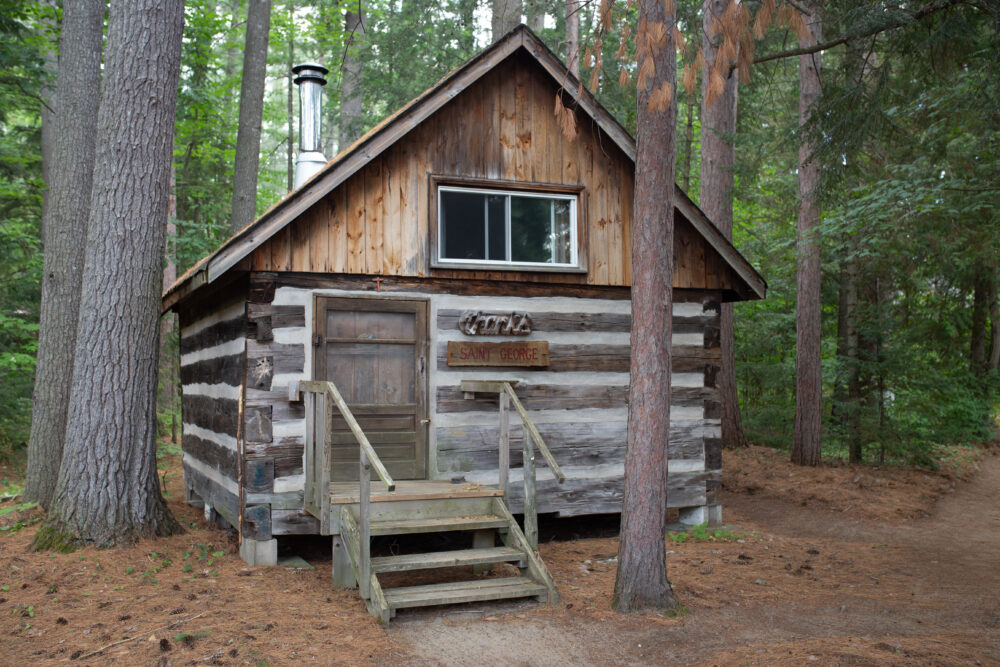
For twenty-four hours you are going to be alone with him…
Poustina. The word is Russian, meaning “desert.” It means, geographically, a place like the Sahara, but it also means more. It means the lonely place that souls sometimes have to enter to find the God who dwells within them. Or it means a wild and lonely place to which a hermit would go to seek God in solitude and silence.
Don’t get frightened by the strange word “poustinia.” Today many people have inaugurated prayer houses. You could call a poustinia a prayer house, but it’s not quite that. It has a Russian accent. That’s why we keep the word “poustinia.”
◈◈◈
Going to the poustinia
What does it mean to go to the poustinia? People hear the word “poustinia.” A mysterious Russian idea! It’s nothing mysterious. Just an ordinary log cabin with a wood stove, a Bible, and a little outline which more or less tells you what it is about.
I can’t tell you what to do there. Nobody can tell you what to do. You are going to have a rendezvous, a date with Christ.
For twenty-four hours you are going to be alone with him, and the only book you are going to read (don’t take any others) is the Bible. It’s there. If you want to sleep, sleep. If you want to walk, walk. It’s up to you. Once you enter the poustinia, you do what the Spirit tells you to do.
There’s nothing frightening about it. Sometimes we are so exhausted mentally, morally…we have such huge problems, or we think they are huge…that we just can’t carry on. Going into a place like that, we just flop! Well, to sleep in the arms of Christ is a pretty good idea.
You don’t have to do anything. In all the simplicity of dealing with God, I often make believe. I say, “Lord, have a cup of coffee with me.” I image God is there and we have a cup of coffee and I chat with him. Okay? Why not?
I made a poustinia in my cabin, before we built any poustinias here, and the first day I slept. I was so exhausted I couldn’t even read the Gospel of the day. I said to the Lord, “Okay, now you have given me the gift of sleep, give me some good dreams.” I had lovely dreams. And the next day I prayed. I was fresh.
You see, there is a sort of relaxation. With God you don’t put on your best manners. You are just yourself. Remember, he knows you from A to Z, from the nails of your toes to the hair of your head. To put on any kind of a show that you think might fool the Lord is absolutely idiotic.
This is one place where you can relax. God knows all about you. You have a little chat with him, snooze a little, chat a little, do a little reading, go out and look at the grass and say, “How beautiful you made this world!” That’s the sort of thing you do. There’s nothing frightening about it.
What do you take with you? One loaf of bread, some water to make tea or coffee. That’s all.
I remember someone telling me about the first time she went. She said, “That was a terrible experience! You know what happened to me?” I said, “Yes, I think I do, but tell me anyhow.”
She said, “All my thoughts buzzed in me like flies. Do you know what I was thinking? I was thinking about all the things that needed doing. I thought of everything but God.” I said, “Oh, that’s perfectly natural.” It takes a long time for modern man to close the wings of his intellect and to open the door of his heart.
What you do in the poustinia is wait. That is very difficult, and that’s the essence of a poustinia. You wait for a day or two or three. The folding of the wings of your intellect!
In this Western civilization everything is sifted through your head. You are so intellectual, so full of knowledge, technical knowledge, all kinds of knowledge, that you have to sift it through.
The poustinia does this. It brings you into contact, first and foremost, with solitude. Secondly, it brings you into contact with God. Even if you don’t feel anything at all, the fact remains that you have come to have a date with God, a very special one, a rendezvous.
The poustinia, if you allow it to, will teach you prayer. A different prayer than perhaps you have been used to. When you fall in love with God, it’s impossible to separate life, breath, from prayer. For prayer is simply a union with God. And prayer does not need words.
When people are in love, they often look at each other in silent rapture. Neither of them talks. When love reaches an apex, it reaches that immense realm of silence where it pulsates and draws, to proportions unknown to those who haven’t entered it.
Such is the life of prayer with God. You enter into God, and God enters into you and the union is constant. It cannot be shed any more.
When you pray, go to your room and close the door…pray to your Father who is unseen—he who sees what you do in private will reward you(Mt 6:6).
Adapted from Desert Call, Summer 1973.
[Photo: Catherine Doherty’s poustinia, St. George]




